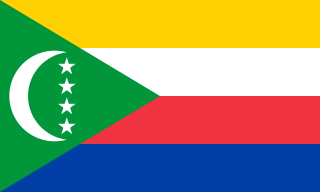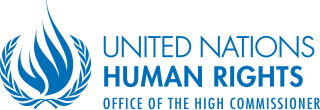Related Research Articles

The Comoros, officially the Union of the Comoros, is an archipelagic country made up of three islands in Southeastern Africa, located at the northern end of the Mozambique Channel in the Indian Ocean. Its capital and largest city is Moroni. The religion of the majority of the population, and the official state religion, is Sunni Islam. Comoros proclaimed its independence from France on 6 July 1975. The Comoros is the only country of the Arab League which is entirely in the Southern Hemisphere. It is a member state of the African Union, the Organisation internationale de la Francophonie, the Organisation of Islamic Co-operation, and the Indian Ocean Commission. The country has three official languages: Shikomori, French and Arabic.

The Council of Europe is an international organisation with the goal of upholding human rights, democracy and the rule of law in Europe. Founded in 1949, it brings together 46 member states with a population of approximately 675 million as of 2023; it operates with an annual budget of approximately 500 million euros.

In November 1975, Comoros became the 143rd member of the United Nations. The new nation was defined as consisting of the entire archipelago, despite the fact that France maintains control over Mayotte.

The Office of the United Nations High Commissioner for Human Rights (OHCHR) is a department of the United Nations Secretariat that works to promote and protect human rights that are guaranteed under international law and stipulated in the Universal Declaration of Human Rights of 1948. The office was established by the United Nations General Assembly on 20 December 1993 in the wake of the 1993 World Conference on Human Rights.

The Inter-Parliamentary Union is an international organization of national parliaments. Its primary purpose is to promote democratic governance, accountability, and cooperation among its members; other initiatives include advancing gender parity among legislatures, empowering youth participation in politics, and sustainable development.
The United Nations Prizes in the Field of Human Rights were instituted by United Nations General Assembly in 1966. They are intended to "honour and commend people and organizations which have made an outstanding contribution to the promotion and protection of the human rights embodied in the Universal Declaration of Human Rights and in other United Nations human rights instruments".
A national human rights institution (NHRI) is an independent state-based institution with the responsibility to broadly protect and promote human rights in a given country. The growth of such bodies has been encouraged by the Office of the United Nations High Commissioner for Human Rights (OHCHR), which has provided advisory and support services, and facilitated access for NHRIs to the United Nations (UN) treaty bodies and other committees. There are over one hundred such institutions, about two-thirds assessed by peer review as compliant with the United Nations standards set out in the Paris Principles. Compliance with the Principles is the basis for accreditation at the UN, which, uniquely for NHRIs, is not conducted directly by a UN body but by a sub-committee of the Global Alliance of National Human Rights Institutions (GANHRI) called the Sub-Committee on Accreditation. The secretariat to the review process is provided by the National Institutions and Regional Mechanisms Section of the OHCHR.

Guinea elects on the national level a head of state—the president—and a legislature. The president is elected for a five-year term by the people through a two-round system. The National Assembly has 114 members, elected for five-year terms, 38 members in single-seat constituencies and 76 members by proportional representation.

The unicameral Assembly of the Union of the Comoros is the country's legislative body. It was established in 2004.

The unicameral Assemblée nationale or National Assembly is Guinea's legislative body. Since the country's birth in 1958, it has experienced political turmoil, and elections have been called at irregular intervals, and only since 1995 have they been more than approval of a one-party state's slate of candidates. The number of seats has also fluctuated.

The unicameral National Assembly is Benin's legislative body.

The foreign relations of the State of Palestine have been conducted since the establishment of the Palestine Liberation Organization (PLO) in 1964. Since the Oslo Accords, it seeks to obtain universal recognition for the State of Palestine on the 1967 borders, with East Jerusalem as its capital. As of 21 June 2024, 145 of the 193 United Nations (UN) member states officially recognize the State of Palestine.

Agnès Callamard is a French human rights activist who is the Secretary General of Amnesty International. She was previously the Special Rapporteur on extrajudicial, summary, or arbitrary executions appointed by the United Nations Human Rights Council, and the former Director of the Columbia University Global Freedom of Expression project.

Parliamentary elections were held in the Comoros on 25 January 2015, alongside local elections. A second round of voting was held on 22 February in the 21 constituencies where no candidate won in the first round. The Union for the Development of the Comoros emerged as the largest party, winning eight of the 24 seats in the Assembly of the Union.

Intersex people are born with sex characteristics, such as chromosomes, gonads, or genitals, that, according to the UN Office of the High Commissioner for Human Rights, "do not fit typical binary notions of male or female bodies."

Portugal is generally considered as successful in upholding the civil liberties and protecting the human rights of its citizens. Portugal has proved to be determined in promoting and respecting human rights at an international and national level. The country's minister of Justice as of September 2018, Francisca Van Dunem, said that Portugal has had "a good track record" on human rights but violations still do persist.
Safia Elmi Djibril is a Djiboutian politician and women's rights activist.
Chamina Ben Mohamed is a Comorian politician.
Bourhane Hamidou is a politician from Comoros who served as President and Speaker of the Assembly of Comoros. He was an independent candidate for 2016 Comorian presidential election in which he got 6,397 votes. He is the supporter of Sun Party of Comoros. In March 2015, he resigned as Speaker. He also served as Minister of Interior and Information.

Parliamentary elections are due to be held in the Comoros in 2025.
References
- ↑ "Statement by Ethiopia" (PDF). Office of the United Nations High Commissioner for Human Rights.
- ↑ "Embassy of Afghanistan to United Nation Office in Geneva" (PDF). Office of the United Nations High Commissioner for Human Rights.
- ↑ "COMOROS (Assemblée de l'Union), Last elections". Inter-Parliamentary Union. Retrieved 2022-10-04.
- ↑ Lansford, Tom (2017-03-31). Political Handbook of the World 2016-2017. CQ Press. ISBN 978-1-5063-2715-0.
- ↑ "Liste des législatures - Assemblée de l'Union" (in French). 2022-03-06. Retrieved 2022-10-04.
- ↑ "Comoros". Inter-Parliamentary Union. 2018-07-05. Retrieved 2022-10-04.